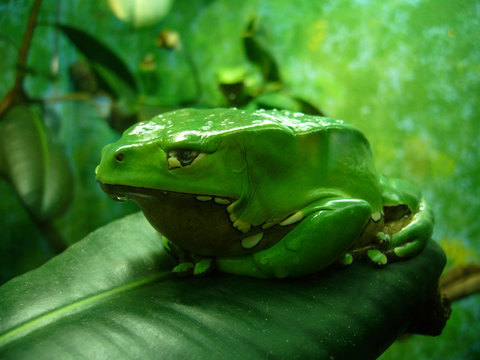ANIMAL: Giant Monkey Frog Phyllomedusa bicolor Type of Animal: Frog Habitat: Humid forest, drier cerrado forest Location(s): Guiana Shield, S/E Venezuela, SE Colombia, E Peru, W/N/C Brazil, N Bolivia Appearance: Very large tree frog, lime green dorsal coloration, white to yellow-white to cream belly, fingers have large adhesive disks, white spots near mouth Food/Diet: Insects, insect larvae, worms Status in Wild: Stable Conservation: Breeding in zoos, aquariums, wildlife centers, & herpetoculture Lifestyle: Solitary or small groups of 2-6 frogs Additional Info: Called: Male Female Young: Tadpole Group: Army Weight: Male: 3.5 oz Female: 4 oz Gestation: 10 days Life Span: 10 years Body Length: Male: 3.6-4.1 in Female: 4.4-4.7 in Main predators of adults are capuchins & snakes. Staphilynid beetles & phorid flies eat eggs. Highly arboreal, very rarely coming to ground. Active at night (nocturnal). For mating, male climbs onto female’s back to fertilize eggs. After mating, leaf-nest constructed in which gelatinous mass of eggs (as many as 600) laid 1.67-2.29 ft above water. Therefore, tadpoles can drop right in water. Tadpole stage lasts 1.5-2.5 months. Once gills disappear & legs develop, they leave water & head for trees, entering froglet stage, which they’re in until 10-12 months old. Large adhesive disks on fingers help them cling to trees. Males call from high up in trees to attract females. Males fight by wrestling-usually no major physical harm occurs. Largest member of Phyllomedusa genus. Sometimes kept as pets. Fun Fact(s): Pigments in skin help refract infrared light. Also called Giant Waxy Monkey Frog, Giant Waxy Monkey Tree Frog, Bicolor Waxy Monkey Tree Frog, Giant Leaf Frog, Blue & Yellow Frog, Biracial Tree Frog, & Kambo. Get ‘waxy’ name due to producing/spreading poisonous waxy substance over skin, helping deter predators. Besides being used as poison, wax-like substance also reduces risk of drying out. Called monkey frogs due to tendency to walk instead of jump. Some Amazonian tribes use poisonous wax/skin secretions in Kambo/Sapo ceremony/cleanese, which involves burning arm/leg, applying secretion (reconstituted w/ saliva/water) directly to burn. This can cause vomiting, violent nausea, headaches, diarrhea, sweating, edema, & fast heart rate. In native practice, secretions removed after 5-10 minutes. Ritual claimed to treat addiction/depression/chronic pain, reduce fevers, boost energy/physical strength, increase fertility, improve mental clarity, cleanse soul/body, & reduce negative energy. Multiple deaths have occurred from ritual & many people get very sick. Kambo also used in alternative medicines worldwide.
